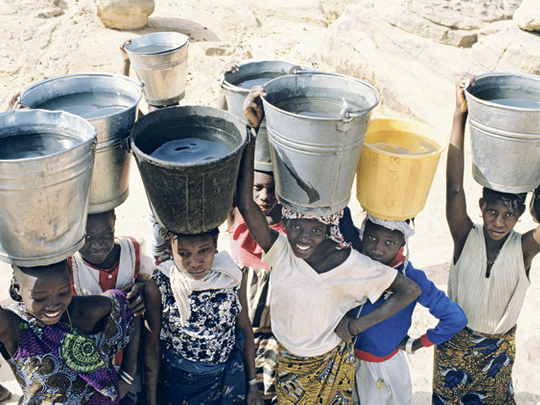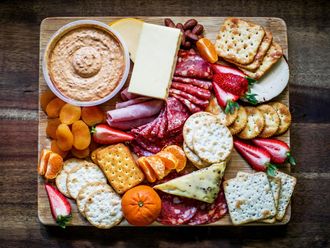
Even in the remote villages of eastern Mali when we pitch up, dusty and tired, children crowd around us, eager for photographs. They love looking at the image replay to find their faces reproduced in tiny forms on the back of the camera. As I flicked through the images, I found an old one of my 14-year-old daughter and explained who she was. A group of elderly women pressed forward to have a look at this unfamiliar image of a blonde girl. One woman, her face creased and lined with age, looked at me with astonishment, "So you are an old woman," she said. I laughed and agreed. But as we looked each other in the eye, we saw the gulf in our life experiences: We were probably about the same age but she looked 20 years older.
Youth fades fast
This is a land in which the women age quickly and it's not hard to see why. Everywhere you see the labour of women. One of their hardest tasks is the pounding of millet; it is harvest time so you can see the women carrying basketfuls of millet from the fields where it has been drying. To separate the seed from the chaff, they stand in groups of three or four to pound with long poles the heads of seed in the carved-out wooden tubs. Usually, they have a baby strapped to their backs as they work.
The gathering of firewood, the hauling of water from the well for two to three hours a day, the weeding and watering of vegetable gardens: All these are the women's responsibility. And many of these women are breastfeeding or pregnant; Mali has one of the highest fertility rates in the world. Having plenty of children is still regarded as the safest pension, the best insurance policy. But the toll on these women is immense as they give birth to children and struggle to keep them fed.
As climate change makes this last task tougher, it is women who carry the burden. And it is women who are central to the efforts to adapt. In the village of Dandoli, where I saw the market gardens, the mayor admitted that the women were the most assiduous in composting. They gathered the animal dung, ashes and vegetable waste. Climate-adaptation strategies are adding to their labour but they recognise its value.
For all their hard work, however, Dandoli illustrated the subservient role of women. As the women described how the vegetable plots worked, they explained how they are dependent on their husbands to secure a plot for them. Land is controlled and distributed by the men — even tiny plots for vegetable gardens. When the women have sold their harvest in the market, they are expected to "present" their earnings to their husband, even if he has had little or nothing to do with growing the vegetables.
The voices of silence
At the formal ceremonies, such as the one held to greet me on my arrival, the men sit around in a circle to introduce themselves while the women are either silent or remain in their homes. But when one insists on speaking to a woman, they are eager to tell their side of the story. And it is often different from that told by the chief. In the village of Dandoli, the chief insisted that the village was much better off since the arrival of the project but a woman called Membara Karambe was much more direct — and more honest. "All the families are affected by the shortage of rainfall. Our only thought is how to feed ourselves. We and our children are starving."
The project has helped women get their voices heard. One woman, Senelou Nantume, said: "Earlier, we couldn't speak about our needs and on issues of community life. In a traditional society, the husband takes all the decisions as the breadwinner but with the gardens, women are more assertive."
Climate change is making women's lives harder and women will bear the brunt of adapting to it.












